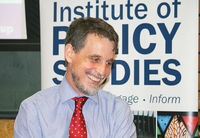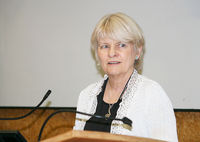The real welfare crisis is the failure of the present system to ‘make wellness and a balanced lifestyle attainable for everyone’ including society’s most vulnerable − children. This is one conclusion from more than 90 submissions published in the Alternative Welfare Working Group’s latest report.
 The group, launched in July and sponsored by Caritas Aotearoa New Zealand, comprises specialists in economics and social policy and has heard submissions from advocates and clients of the current welfare system in the past three months.
The group, launched in July and sponsored by Caritas Aotearoa New Zealand, comprises specialists in economics and social policy and has heard submissions from advocates and clients of the current welfare system in the past three months.
The alternative group considered whether the welfare system was in crisis and concluded that the system needs a radical reordering.
‘The biggest asset any country has is its children and young people and, if for no other reason than the economic wellbeing of the baby boomers, we should, over the next 20 years, make children and young people our priority.’
Submitters felt that a focus on the wellbeing of all citizens rather than on work would be more just.
‘A focus on wellbeing will provide a quite different set of recommendations that will not only make welfare reforms more sustainable, but will do so by moving us towards a fairer society in practice.’
Many submissions focused on the sense of powerlessness people receiving benefits feel when decisions are made on their behalf ‘against a background of constantly changing policy’.
 Public debates where large amounts of information were not backed up with figures were described as ‘beneficiary bashing’, ‘scapegoating’, ‘labelling’, ‘untested assumptions’, ‘mechanistic behavioural assumptions’, ‘inaccurate portrayals’, ‘lots of generalisations about “bludgers” without figures’ and ‘using high profile examples of bad behaviour to tar everyone with the same brush’. Some participants described this as a form of domestic violence ‘in which vulnerable citizens are targeted for public abuse’, the report said.
Public debates where large amounts of information were not backed up with figures were described as ‘beneficiary bashing’, ‘scapegoating’, ‘labelling’, ‘untested assumptions’, ‘mechanistic behavioural assumptions’, ‘inaccurate portrayals’, ‘lots of generalisations about “bludgers” without figures’ and ‘using high profile examples of bad behaviour to tar everyone with the same brush’. Some participants described this as a form of domestic violence ‘in which vulnerable citizens are targeted for public abuse’, the report said.
‘One submission, for example, argued that the welfare system needs to be given some independence from politicians to reduce prejudice against people receiving social welfare support.’
Meanwhile, the group’s chair, social policy professor Mike O’Brien says the government’s Welfare Working Group initial report is that there are fundamental concerns about the directions, given the stories and experiences shared with the Alternative Welfare Working Group through its 15 public meetings and 91 written submissions. “The ‘options’ in the Options paper do not bode well for building an effective social security structure.”
This was particularly evident, for example, in the options recommended around impacts on children, Work and Income decision-making, the reality of the employment market and the implications for beneficiaries.
‘While recognising this is an Options Paper, some outcomes within the scope of the recommendations would result in the creation of a draconian, two-tier society. The implications, especially for children, are particularly worrying.’
To see the full report Welfare Justice: what we heard, go to www.alternativewelfareworkinggroup.org.nz
Images: top Lincoln University economics professor Paul Dalziel and above right, Dr Susan St John, economist and adviser to the Alternative Welfare Working Group.